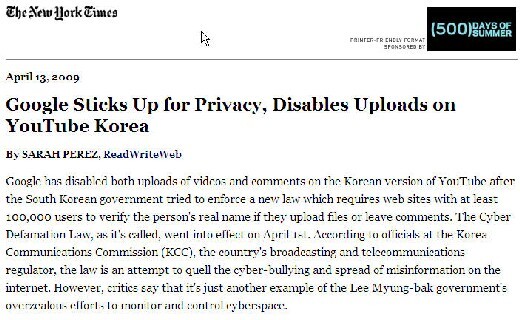hankyoreh
Links to other country sites 다른 나라 사이트 링크
Google’s refusal to comply with user data collection draws attention worldwide

Major media outlets and technical journals throughout the world have consecutively reported on Google’s practices in South Korea. Most recently, the world’s largest Internet company voluntarily disabled functions related to user uploads and comments on the Korean version of its YouTube video portal causing ripples that go beyond users in South Korea.
On April 13(local time), the New York Times, Washington Post and The Wall Street Journal had all posted articles in their online editions about Google’s practices in South Korea.
In an article, “Google Sticks Up for Privacy, Disables Uploads on YouTube Korea”, New York Times quoted Lucinda Barlow, a spokeswoman for YouTube in Asia as saying, “We have a bias in favor of freedom of expression and are committed to openness.” The New York Times also reported that according to the Hankyoreh, Rachel Whetstone, vice president of Global Communications & Public Affairs at Google said “We concluded in the end that it is impossible to provide benefits to internet users while observing this country’s law because the law does not fall in line with Google’s principles.”
In an article “To Avoid Korean Law, YouTube Disables Some Features,” the Wall Street Journal stated, “The move garnered new attention Monday, after it was reported by a Korean publication, Hankyoreh.” They added through an interview with Scott Rubin, a spokesman for Google, YouTube’s parent company, said, “it devised the compromise because it believes in users’ rights to be anonymous online.” The Washington Post also reported on Google’s Internet user policy in South Korea in the article, “Google Decides Not To Cave To South Korean Government.”
Major technology magazines, such as CNET, ZDNET and PC World, also reported on Google’s decision on the same day.
Some industry experts in South Korea interpret Google’s decision in South Korea as indicating how vulnerable Internet freedom is. Jeon Eung-whi, a standing member of Green Consumers Network in Korea, said, “This affair has given an impression to the world that ‘South Korea is an advanced nation in terms of technology, however, is a backwards nation in terms of freedom.’” He added, “This has resulted in weakening the competitive power of Korean Internet companies.”
Please direct questions or comments to [englishhani@hani.co.kr]
Editorial・opinion
![[Column] Park Geun-hye déjà vu in Yoon Suk-yeol [Column] Park Geun-hye déjà vu in Yoon Suk-yeol](https://flexible.img.hani.co.kr/flexible/normal/500/300/imgdb/original/2024/0424/651713945113788.jpg) [Column] Park Geun-hye déjà vu in Yoon Suk-yeol
[Column] Park Geun-hye déjà vu in Yoon Suk-yeol![[Editorial] New weight of N. Korea’s nuclear threats makes dialogue all the more urgent [Editorial] New weight of N. Korea’s nuclear threats makes dialogue all the more urgent](https://flexible.img.hani.co.kr/flexible/normal/500/300/imgdb/original/2024/0424/7317139454662664.jpg) [Editorial] New weight of N. Korea’s nuclear threats makes dialogue all the more urgent
[Editorial] New weight of N. Korea’s nuclear threats makes dialogue all the more urgent- [Guest essay] The real reason Korea’s new right wants to dub Rhee a founding father
- [Column] ‘Choson’: Is it time we start referring to N. Korea in its own terms?
- [Editorial] Japan’s rewriting of history with Korea has gone too far
- [Column] The president’s questionable capacity for dialogue
- [Column] Are chaebol firms just pizza pies for families to divvy up as they please?
- [Column] Has Korea, too, crossed the Rubicon on China?
- [Correspondent’s column] In Japan’s alliance with US, echoes of its past alliances with UK
- [Editorial] Does Yoon think the Korean public is wrong?
Most viewed articles
- 1‘We must say no’: Seoul defense chief on Korean, USFK involvement in hypothetical Taiwan crisis
- 2N. Korean delegation’s trip to Iran shows how Pyongyang is leveraging ties with Moscow
- 3Amnesty notes ‘erosion’ of freedom of expression in Korea in annual human rights report
- 4[Column] Park Geun-hye déjà vu in Yoon Suk-yeol
- 5‘Weddingflation’ breaks the bank for Korean couples-to-be
- 6[Reportage] On US campuses, student risk arrest as they call for divestment from Israel
- 7[Guest essay] The real reason Korea’s new right wants to dub Rhee a founding father
- 8[Editorial] New weight of N. Korea’s nuclear threats makes dialogue all the more urgent
- 9Will NewJeans end up collateral damage in internal feud at K-pop juggernaut Hybe?
- 10Why Korea shouldn’t welcome Japan’s newly beefed up defense cooperation with US